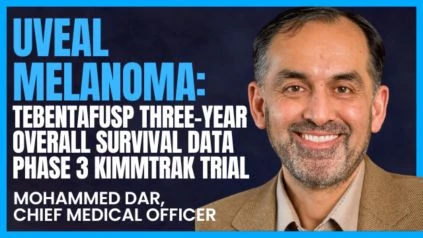By. Mohammed Dar, MD
Date. November 02, 2023
Mohammed Dar, MD, observed significant advancements in the treatment of metastatic uveal melanoma, particularly for HLA-A02:01 positive patients with the introduction of tebentafusp (TA BENT A FUSP). In comparison to the control group, tebentafusp demonstrated notable improvements in overall survival rates. The specific data revealed a substantial increase in survival rates among patients receiving tebentafusp compared to those in the control group. This has a significant impact on the current standard of care for HLA-A02:01 positive patients, potentially reshaping treatment protocols for this subgroup.
Regarding early survival benefits, the first six weeks of tebentafusp treatment have shown promise. Patients demonstrated an improved survival rate during this initial phase, setting a positive trajectory for their long-term outcomes. When compared to other existing cancer immunotherapies, the early and sustained survival benefits of tebentafusp stand out, potentially indicating a more rapid and durable response in the early stages of treatment.
The evaluation of circulating tumor DNA (ctDNA) clearance has emerged as a valuable predictor of overall survival in tebentafusp treatment. The significance lies in its potential to serve as a biomarker for treatment response. The clearance of ctDNA during tebentafusp therapy may correlate with better patient outcomes, providing crucial insights for physicians to monitor and tailor treatments for individual patients.
At the ESMO presentations, the reprogramming effect of tebentafusp on immunosuppressive M2 macrophages was a highlight. This effect plays a pivotal role in halting tumor progression. Tebentafusp’s ability to reprogram these M2 macrophages shifts the tumor microenvironment towards an anti-tumor immune response. This reprogramming contributes significantly to the efficacy of tebentafusp in treating metastatic uveal melanoma, as it enhances the immune system’s ability to recognize and attack cancer cells.
The analysis of subsequent therapies in first-line metastatic uveal melanoma patients indicated that the survival benefit primarily stems from tebentafusp treatment. This finding underscores the sustained effectiveness of tebentafusp even in the presence of subsequent therapies, such as checkpoint inhibitors. This suggests that tebentafusp may provide a foundational and durable benefit, potentially guiding treatment decisions for physicians by considering its effectiveness as an initial treatment, even in the context of subsequent therapies.
Dr. Mohammed Dar acknowledges that the developments in tebentafusp treatment hold significant promise for the future of metastatic uveal melanoma management, marking a substantial shift in the landscape of treatment options for this patient population.

